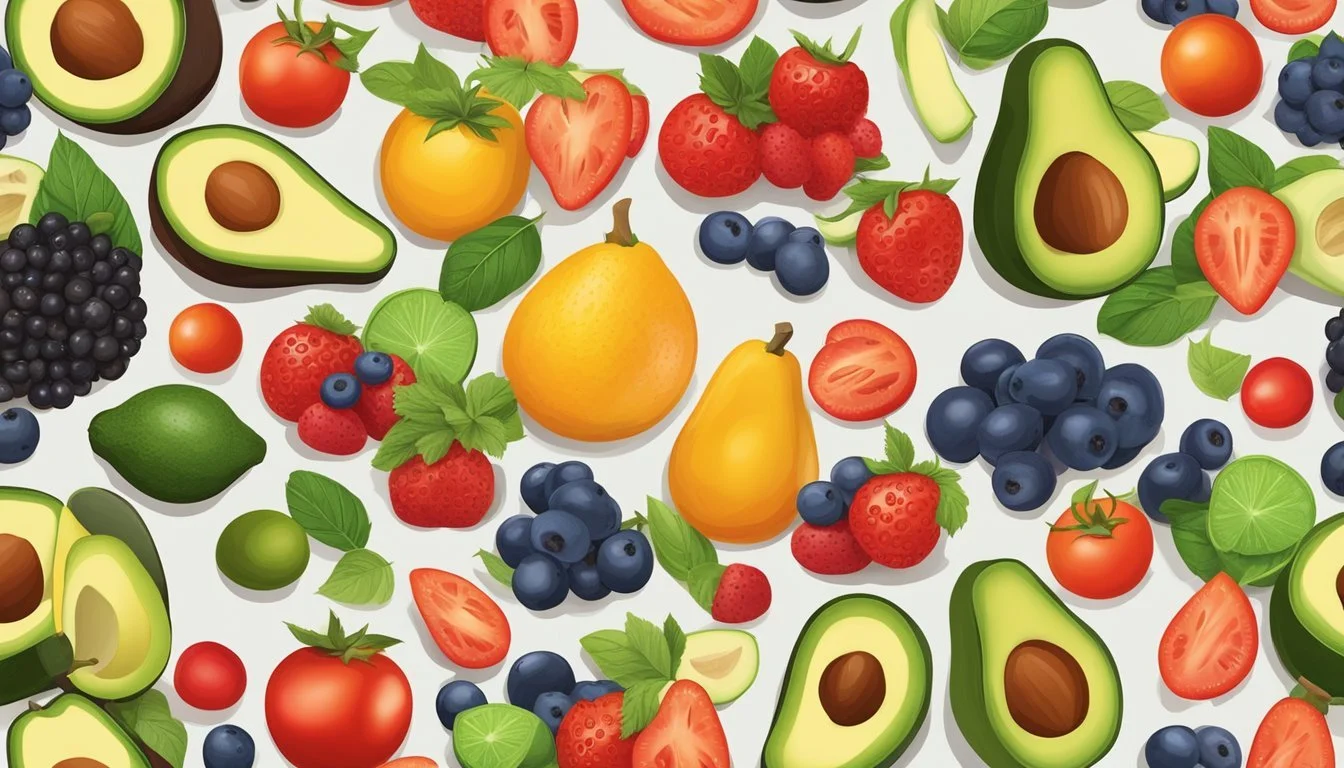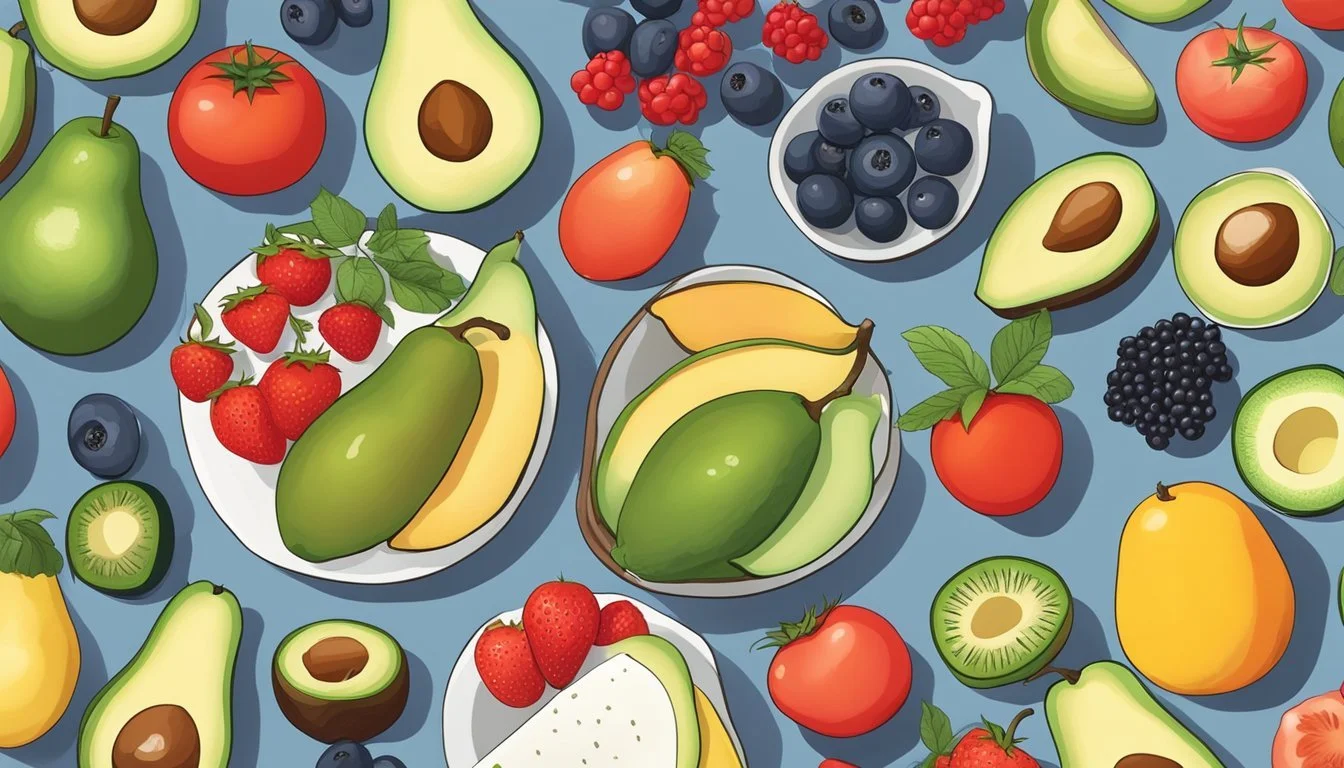Keto Diet: Low-Carb Fruits That Fit Your Plan
The ketogenic diet emphasizes low-carb, high-fat foods to prompt the body into a state of ketosis, in which it burns fat for energy rather than carbohydrates. While the diet restricts high-carb foods like starchy vegetables and grains, it does accommodate certain fruits that align with its macronutrient guidelines.
Incorporating fruits (What wine goes well with fruits?) into a keto diet requires careful consideration of their net carb content—total carbs minus fiber—to ensure they don't exceed the daily carb limit and disrupt ketosis. Low-carb fruits are favored, as they typically contain fewer sugars and are rich in fiber, effectively lowering their net carb value. They include berries such as raspberries, blackberries (how long do blackberries last?) , and strawberries, which can be consumed in moderation.
Not all fruits are conducive to maintaining ketosis due to their higher sugar and carb content. It's essential for individuals on the keto diet to be mindful of their fruit choices, opting for those that offer the sweetness and nutritional benefits without compromising their metabolic state. Avocados and tomatoes, often categorized as vegetables, are technically fruits and are highly recommended for their low net carb content and high-fat content, bolstering the diet's macronutrient requirements.
Understanding Keto Diet
The ketogenic, or keto, diet emphasizes consumption of healthy fats and proteins while strictly limiting carbohydrates. This section will cover the guiding principles of the ketogenic diet and the metabolic state of ketosis, which together facilitate its potential health benefits.
Principles of Ketogenic Diet
The keto diet operates on a simple yet strict principle: minimal carbohydrate intake typically between 20 to 50 grams per day, forcing the body to switch from using glucose as its main source of energy to burning fat. By significantly reducing the intake of carbs, the diet encourages the body to enter a state called ketosis. The core components of a ketogenic diet encompass:
High intake of healthy fats: Approximately 70% to 80% of total daily calories from fats like avocados, coconut oil, and nuts.
Moderate protein intake: Around 20% to 25% of daily calories from proteins such as meat, fish, and eggs.
Very low carbohydrate intake: Roughly 5% or less of daily calories from low-carb vegetables, nuts, and dairy with minimal to no grains or sugars.
Benefits of Ketosis
When the body enters ketosis, it begins to use ketones derived from fats for energy, rather than glucose from carbohydrates. The benefits of achieving ketosis through the ketogenic diet can include:
Weight Loss: Heightened fat metabolism often leads to weight reduction, as the body uses stored fat for energy.
Reduced Appetite: Ketones have an appetite-suppressing effect, which can benefit those aiming to control caloric intake.
Stable Blood Sugar Levels: With lower carb intake, blood sugar levels typically stabilize, benefiting those with insulin resistance or diabetes.
Potential Heart Health Improvement: The increase in healthy fat consumption may lower bad cholesterol levels, potentially reducing the risk of heart disease.
Anti-inflammatory Effects: Ketosis can lead to a reduction in inflammation markers in the body.
By adhering to the principles of a low-carb diet, individuals may experience the state of ketosis and its associated health benefits. However, one should consider individual dietary needs and consult with healthcare providers before making significant dietary changes.
Keto Diet Macronutrients
The keto diet focuses on altering the body's fuel source from carbohydrates to fats, necessitating a precise balance of macronutrients.
Role of Carbohydrates
In a ketogenic diet, carbohydrates are significantly reduced to typically around 5-10% of total caloric intake. This limited carbohydrate consumption helps to induce ketosis, a state where the body uses fat as its main energy source. High-fiber, low-carb fruits can contribute to this carb intake while providing essential nutrients.
Importance of Fats
Fats are the cornerstone of the keto diet, comprising about 70-80% of daily calories. These are not just any fats, but preferably healthy fats which include monounsaturated and polyunsaturated fats. They are vital for maintaining energy levels and facilitating the absorption of fat-soluble vitamins.
Proteins in Keto
Proteins should occupy about 20-25% of a ketogenic dieter's caloric intake. They are essential for maintaining muscle mass and proper bodily functions. However, it's important to balance protein consumption as excessive amounts can be converted into glucose, which may hinder the ketosis process.
Permissible Fruits on Keto
When following a ketogenic diet, individuals must select fruits that are low in net carbs to stay within their daily carbohydrate limit. Certain fruits like berries, avocado, and tomatoes are keto-friendly due to their lower net carb content.
Berries and Their Carb Counts
Berries are celebrated for their nutritional value and are deemed acceptable in moderation on a ketogenic diet due to their lower net carb content. Here's a quick look at some commonly consumed berries and their net carbs per 100 grams:
Strawberries: 5.68 grams of net carbs
Raspberries: 5.44 grams of net carbs
Blackberries: 4.31 grams of net carbs
Blueberries (use with caution): 11.6 grams of net carbs
It's important for one to measure portion sizes to avoid exceeding their daily carb limit, as these values can add up.
Benefits of Avocado and Tomato
Avocado is a fruit uniquely suited for the keto diet due to its high fat and low carb content. Per 100 grams, avocado contains roughly 1.84 grams of net carbs. This fruit is also rich in healthy fats, which aligns with the keto dietary emphasis on fat consumption for energy.
Tomatoes are another keto-conducive fruit that can be integrated into a variety of dishes. Tomatoes contain about 2.69 grams of net carbs per 100 grams. Aside from being low in net carbs, they provide beneficial nutrients and are versatile in many keto-friendly recipes.
Other fruits that can be incorporated into a keto diet in controlled amounts include coconut and rhubarb, both being relatively low in net carbs. Individuals on keto can enjoy these fruits while adhering to the diet's low-carb prerequisites.
Nutritional Considerations
When selecting fruits on a keto diet, it's essential to understand how the fruit's carbohydrate content and nutritional benefits play into the diet's strict macro-nutrient requirements.
Evaluating Net Carbs
Net carbs are calculated by taking the total carbohydrates in a fruit and subtracting dietary fiber, as the body does not digest fiber. On the keto diet, individuals should focus on fruits with low net carbs to maintain a state of ketosis.
Berries: A cup of raspberries contains 7g net carbs, blackberries about 6g, and strawberries 8g.
Avocado: Half a medium avocado provides roughly 2g net carbs.
Fiber and Its Benefits
Fiber is a crucial component in fruits and offers benefits such as aiding digestion and providing a sense of fullness, which can help with weight management.
Berries: High in fiber, with raspberries at 8g per cup and blackberries 7.6g.
Avocados: Exceptionally high in fiber, with approximately 10g per medium avocado.
Vitamins and Minerals in Fruits
Fruits suitable for a keto diet offer an array of vitamins and minerals necessary for optimal health.
Vitamins: Citrus fruits are high in Vitamin C, while avocados are rich in Vitamin K and potassium.
Minerals and Antioxidants: Berries are loaded with antioxidants, manganese, and vitamins. Tomatoes, which are technically a fruit, contain lycopene and beta-carotene.
Keto Fruit Guidelines
In a keto diet, individuals should prioritize low-carb fruits to maintain ketosis. It is critical to understand which fruits they can enjoy and which they should avoid due to their high sugar and carb content.
Choosing Low-Carb Fruits
When selecting fruits for a keto diet, one should look for options that have the lowest carbohydrate content. Typically, berries such as raspberries, blackberries, and strawberries can be accommodated in small quantities. Below is a list of some keto-friendly fruits with their net carb content per 100 grams:
Raspberries: 5g net carbs
Blackberries: 5g net carbs
Strawberries: 6g net carbs
Avocado: 2g net carbs
Lemon: 3g net carbs
These fruits, apart from being low in carbs, are high in fiber which can help reduce the net carb intake. One should be mindful of portion sizes to stay within the daily carb limit.
Fruits to Limit or Avoid
Fruits that are high in sugars and carbs should be limited or avoided on a keto diet. This typically includes tropical fruits and fruits that taste sweeter. Here is a table of common fruits and their approximate net carb content that are generally not recommended for a ketogenic diet:
Fruit Net Carbs (per 100g) Apple 14g Banana 20g Orange 12g Pineapple 13g
Although these fruits have nutritional benefits, their high carb content could interfere with maintaining a state of ketosis. It's essential for someone on a keto diet to focus on the carb content to make wise fruit choices.
Implementing Fruits in Keto Meal Plan
In a ketogenic meal plan, the incorporation of fruits requires a careful balance of sweetness and carbohydrate content to ensure they align with the low-carb, high-fat dietary requirements.
Creating Balanced Keto Recipes
One can create balanced keto recipes by strategically selecting fruits that offer a sweet taste without exceeding the daily carbohydrate limits. Berries such as raspberries, blackberries, and strawberries can be included due to their lower carb content. Incorporating them into a meal plan adds not only variety but also essential vitamins and antioxidants with minimal impact on the overall carbohydrate count. For example, carambola, or star fruit, can be used as a tropical addition, offering a sweet and tangy flavor while being keto-friendly.
To maintain ketosis, individuals should prioritize fruits that are nutrient-dense and low in net carbs. Olives, while not typically thought of as fruit, are an excellent addition to keto recipes. They provide healthy fats, are low in carbohydrates, and can add a savory note to meals. When using fruit in recipes, one should consider both the raw and cooked forms, as cooking can alter the carb content and the glycemic index of fruits.
Meal Timing and Portions
Managing meal timing and portions is crucial to staying within ketogenic guidelines when fruits are added to a diet. Eating fruit as a part of a balanced meal can help mitigate potential spikes in blood sugar levels. Portions should be kept small; consuming fruit in moderation allows for the sweet taste of fruit to be enjoyed without compromising the meal plan's structure.
Fruit Portion Size Net Carbs Raspberries 1/4 cup 1.5g Blackberries 1/4 cup 1.9g Strawberries 1/4 cup 1.8g Carambola (star fruit) 1/2 cup 2.6g Olives 10 large olives 1.5g
Individuals should also consider the timing of their fruit intake. Eating fruit earlier in the day or around workouts can be preferable so that the body can use the energy provided from the fruits' natural sugars. The inclusion of keto-friendly fruits in recipes can vary based on personal carbohydrate limits and goals.
Potential Health Impacts
In considering the potential health impacts of low-carb fruits within a ketogenic diet, it is crucial to examine their effects on weight management, cardiovascular health, and cancer prevention. These aspects offer insightful perspectives on the diet's role in overall well-being.
Fruits and Weight Loss
Low-carb fruits play a pivotal role in weight loss for individuals on a ketogenic diet. By supplying essential nutrients while keeping carbohydrate intake low, these fruits contribute to the state of ketosis, whereby the body utilizes fat as its primary energy source. This metabolic state is often linked to increased fat burning and weight loss.
Influence on Cholesterol and Heart Disease
One's cholesterol levels and heart disease risk may be influenced by fruit consumption on a ketogenic diet. Certain fruits, like avocados and berries, are rich in fiber and healthy fats which may help in maintaining heart health. Avocados, specifically, are high in monounsaturated fats that can positively affect cholesterol levels. However, the ketogenic diet as a whole, which is high in saturated fats, must be approached cautiously with respect to heart health.
Fruits Role in Cancer Prevention
The intake of certain low-carb fruits within a ketogenic diet could play a role in cancer prevention. These fruits often have high levels of antioxidants that combat oxidative stress and inflammation, factors that can lead to cancer development. For example, berries contain compounds like anthocyanins which are studied for their cancer-preventive properties. However, strict ketogenic diets also significantly reduce the intake of several fruit groups, potentially impacting the availability of cancer-preventive nutrients.
Controversies and Misconceptions
The keto diet promotes low-carb fruit consumption, yet common controversies stem from the sugar debate and myths regarding what fruits are keto-compliant. Understanding these aspects is crucial for a factual approach to keto fruit selection.
The Sugar Debate
Natural Sugars in Fruit: Opponents of keto often argue that fruit, by its nature, contains sugars which could disrupt ketosis. However, certain fruits have low enough carb counts to fit within the keto framework. The contention lies in the fine line between the quantity and type of fruit consumed versus maintaining the diet's low-carb necessity.
Evidence-based Viewpoint: There is a consensus that fructose, the sugar present in fruit, influences blood sugar levels less dramatically than refined sugars. Therefore, it's essential to discern between added sugars and naturally occurring sugars in fruits. Consuming whole fruits with low net carbs in moderation can align with a strict keto regimen.
Understanding Keto Fruit Myths
Keto-Compatible Fruits: Many people mistakenly believe all fruits are off-limits on a keto diet due to sugar content. However, some fruits are low in carbs and can be included in a keto diet. It's important to refer to an accurate carbs list to make informed decisions.
Scientific References: Research indicates that fruits such as berries can be consumed in controlled amounts without exceeding a typical keto daily carb limit. For instance:
Fruit Net Carbs (per 100g) Raspberries 5.4g Strawberries 6g Blackberries 4.3g Blueberries 12.1g
The inclusion of these fruits in a keto diet depends on portion size and balancing the day's overall carb intake. Thus, individuals must understand that not all fruits equate to being non-keto, but rather it's the quantity and total daily carbs context that matter.
Supplementary Keto Foods & Beverages
While low-carb fruits are integral to a ketogenic diet, vegetables and beverages also play a crucial role. They supplement the diet with essential nutrients and ensure necessary hydration without compromising the low-carb ethos of keto living.
Incorporating Vegetables
On a ketogenic diet, vegetables provide fiber, vitamins, and minerals with minimal carbohydrates. For optimal health, one should focus on leafy greens and above-ground vegetables such as:
Spinach
Broccoli
Cauliflower
Zucchini
Root vegetables like carrots or beetroot have higher carb content and should be consumed in moderation. A helpful strategy is to choose vegetables with a carb count of 5g or less per 100g serving.
Keto-Friendly Beverages
Hydration is key on any diet; however, many drinks contain hidden sugars that can disrupt ketosis. Here are some keto-compliant beverage choices:
Water: The most important beverage for necessary hydration.
Tea: Herbal blends or simple black or green tea are excellent choices.
Beverages like soda or juice are not recommended due to their high sugar content, but adding a slice of lime can enhance flavor while keeping carbs low. Options like unsweetened almond milk or bone broth can also be considered for variety.
Conclusion
Individuals adhering to a ketogenic diet must carefully select fruits that maintain the delicate balance of macronutrients required to sustain ketosis. Avocados and berries, such as strawberries, raspberries, and blackberries, are generally suitable as they have lower carb content compared to fruits like bananas and apples.
Research suggests that from an evolutionary perspective, humans consumed a diet low in carbohydrates for significant periods, which may support the principles of the ketogenic diet. That said, the introduction of a ketogenic diet into a person's nutritional regimen should always be made under the guidance of healthcare professionals and potentially subjected to a medical review board to ensure its safety and efficacy.
The inclusion of low-carb fruits can provide essential vitamins, minerals, and fiber, contributing to the overall nutritional value of the diet without disrupting the state of ketosis.
Below is a brief list of fruits that are generally considered keto-friendly along with their approximate net carbs per 100 grams:
Avocado: 2g net carbs
Raspberries: 5g net carbs
Strawberries: 6g net carbs
Blackberries: 5g net carbs
Lemons: 6g net carbs
Tomatoes: 3g net carbs
It's recommended that individuals monitor their daily carb intake to ensure it aligns with their personalized ketogenic regimen. When in doubt, consulting with a nutritionist or dietitian can help tailor a plan that is both nutritious and keto-compliant.





